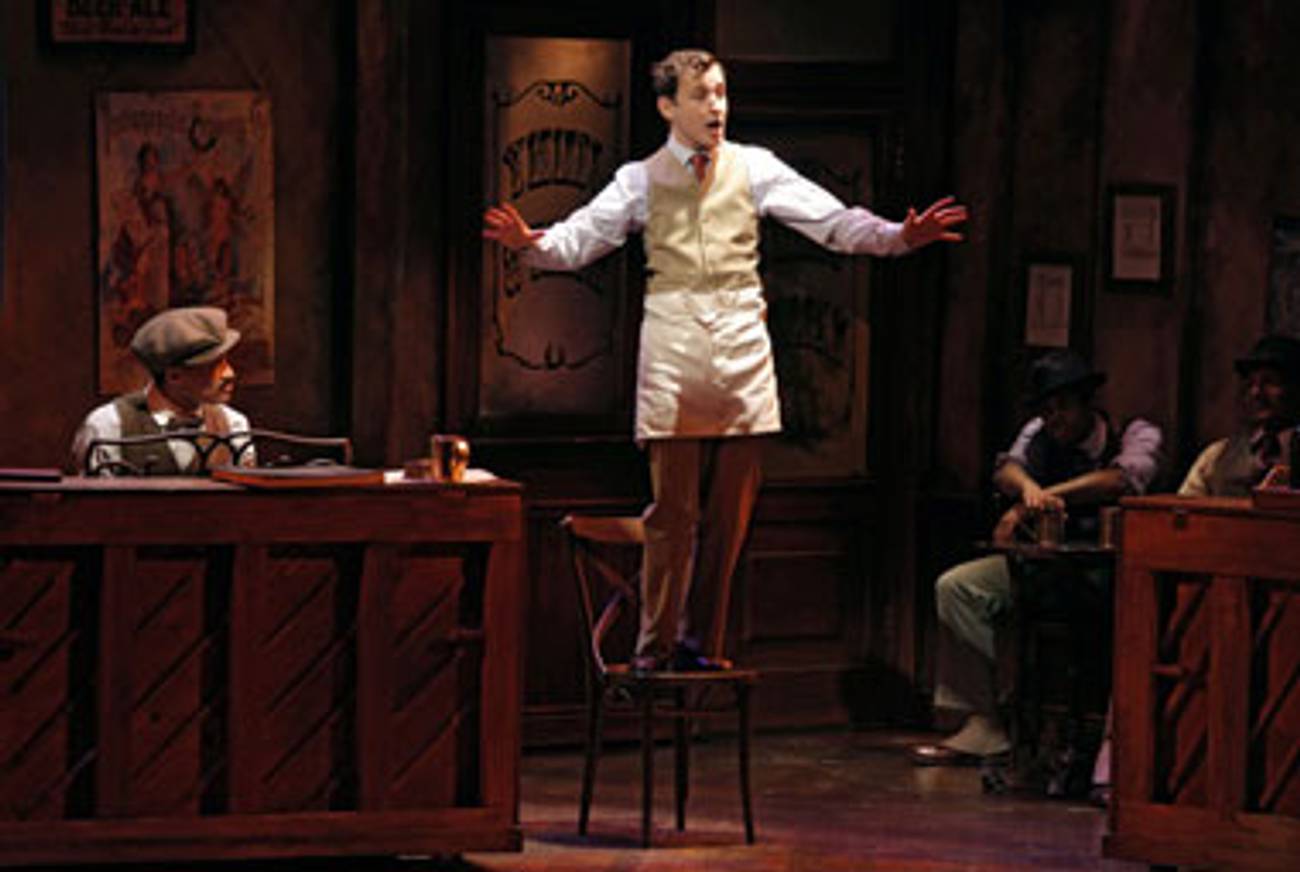Rags and Riches
What the new Tin Pan Alley Rag teaches us about Irving Berlin and the other Jews who wrote the American songbook




The Tin Pan Alley Rag, which opened last night at the Laura Pels Theatre in New York, recounts an imagined meeting between two giants of the American songbook: Irving Berlin and Scott Joplin. The two were famous and successful in the same pre-World War I period—Berlin starting his career; Joplin late in his—and though they were both living and working in New York, there’s no record they ever met. Playwright Mark Saltzman spoke to Tablet about his play, Tin Pan Alley, and the Jews who invented it.
Berlin represents commerce in your play—the successful hitmaker—while Joplin represents art, hard at work on a ragtime opera he couldn’t get produced. Joplin goads Berlin into revealing that he has a secret, major work, a sort of a symphony telling his own American story. Was there a really such piece?
There was, but I couldn’t use it. It was also a ragtime opera, and it would just be too unbelievable that two of them would be writing two ragtime operas. So I turned it into more of an instrumental piece, but still a piece of serious music.
But then Berlin’s businessman instincts overtake his artistic aspirations, and that symphony instead becomes “Alexander’s Ragtime Band”—and the Eastern European motifs, representing his Russian childhood in that symphony, turn into the opening chords of “Alexander’s.” Is there that influence in the real song?
Not specifically in “Alexander’s.” But, sure, in songs like “Yiddishe Nightingale.” What’s interesting, I think, is that in pre-World War I America it was fine to do blatantly Yiddish and Jewish-influenced popular songs, like “Yiddishe Nightingale.” And then something happened along the way and made it taboo. I don’t know why this happened, but in silent movies there are Jewish characters, and these songs like “Yiddishe Nightingale” are sheet music that everybody sings. But then there’s this exclusion, the feeling that sort of we have to hide ourselves. Maybe because a lot of these media companies, in music publishing or movies, were headed by Jews. It wasn’t till the 1950s that Jewish characters started appearing again in the movies. Irving Berlin was writing blatantly Jewish songs, and then he stopped, completely I think, for the rest of the career.
Was it the flip side of the same coin—that to deracinate, to not write things like “Yiddishe Nightingale,” allowed him to write things like “White Christmas”?
When you’re in pop culture, which is sales, there’s a sense, like in all marketers, of what the public is going to buy. Every writer wants a Christmas song; it comes around every year. It’s one of the pots of gold in the music business, and the biggest pot of gold has been “White Christmas,” which to me has a little Yiddish melody in it. You know the cantorials, those notes you had to learn for your bar mitzvah? Those notes are very close together—the distance between the notes are almost as close as you could sing. If you listen to “White Christmas”—put some Hebrew words to that, see if it’s your bar mitzvah chant.
One of the things about the Jewish songwriters—I think Cole Porter pointed this out—is that because of growing up with cantorials, those bar mitzvah chants, those close notes, they were comfortable writing that. It’s not standard to English-Irish music, where a lot of our music came from. But this Middle Eastern kind of sound, for the Jewish songwriters, that came very easily. It wasn’t strange, and it wasn’t exotic, and it’s very affecting—to the general public it kind of corkscrews into your heart.
So the reason so many Jews were Tin Pan Alley songwriters is because they learned to chant their bar mitzvah portions?
I think that’s part of it. But Tin Pan Alley wasn’t just composing. It was also coming up with a way of taking music and selling it. And I think a lot of the Jews coming into New York had to learn that peddler way of monitoring the customer, for survival—I know what he wants, and I know what he’ll pay. That idea of, take a piece of sheet music and sell it as if it was a tie or a new style of skirt, and have marketers around the country, and break it all at once, and get that product moving—Tin Pan Alley invented that.
And Irving Berlin, the play suggests, was all businessman. He turns that symphony into “Alexander’s” so he can sell it.
But he created a deathless piece of art. He may have created miniatures rather than murals, but I’ll take my Faberge egg. In fact it turns out that Joplin was kind of wrong about musical art in America in the 20th century. He thought American operas would be the great art. But there aren’t many American operas. Whereas I can hand you the great American songbook, and this is our art, this is the peak of our musical art.
You could argue there’s something specifically American about an art form that derives in part from commerce.
Could be. But, you know, Mozart had to fill his seats if he was going to write another opera.
In October, Nextbook Press will publish David Lehman’s A Fine Romance: Jewish Songwriters, American Songs. It’s available for purchase in advance from Amazon.
Jesse Oxfeld, a former executive editor and publisher of Tablet Magazine, is a freelance theater critic. He was The New York Observer’s theater critic from 2009 to 2014.
Jesse Oxfeld, a former executive editor and publisher of Tablet Magazine, is a freelance theater critic. He was The New York Observer’s theater critic from 2009 to 2014.